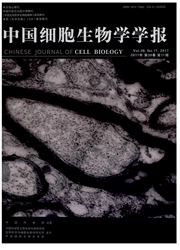

 中文摘要:
中文摘要:
研究新合成的小分子吡啶锰配合物Adpa-Mn(III)([(Adpa)Mn(μ2-O)2Mn(Adpa)]PF6.8H2O(Adpa=bis(2-pyridylmethyl)amino-2-propionic acid))的抗肿瘤作用,初步探索其抗肿瘤的机制。MTT分析Adpa-Mn(III)对细胞活性的影响;活细胞工作站观察GFP荧光标记组蛋白HeLa细胞的细胞核形态,MDC染色以及GFP-LC3质粒转染,探讨细胞死亡的方式;JC-1染色检测线粒体膜电位;Fluo-3-AM和DCFH-DA荧光探针分别检测细胞中Ca^2+和ROS的含量。结果发现,Adpa-Mn(III)剂量依赖性地抑制细胞活性;给药后细胞核出现固缩、片段化;自噬小泡增多,GFP-LC3荧光强度增强;线粒体膜电位下降;细胞内Ca^2+发生超载,ROS含量升高。由此,Adpa-Mn(III)可抑制肿瘤细胞活性,其机制与引起线粒体膜电位下降、增加ROS生成及诱导细胞的死亡有关,同时胞内Ca^2+超载也参与了该作用。这些数据显示,Adpa-Mn(III)具有成为抗肿瘤先导金属配合物的潜在可能性。
 英文摘要:
英文摘要:
In this study,anticancer activity of the novel manganese-pyridine compound Adpa-Mn(III)([(Adpa)Mn(μ2-O)2Mn(Adpa)]PF6·8H2O(Adpa=bis(2-pyridylmethyl) amino-2-propionic acid)) and its possible mechanism were investigated.Four human cancer cell lines including HepG-2,HeLa,A549 and U251 cells were treated by manganese-pyridine derivative Adpa-Mn(III).Cancer cell proliferation were detected by MTT assay.To observe cell apoptosis,the morphological and nuclei changes in H2B-GFP-labled HeLa cells were observed by a live cell system(LCS).Autophagic cell death was studied with acidic vesicular organelles observation following monodansylcadervarine(MDC) labeling and autophagy-related proteins GFP-LC3 plasmid transfection.Mitochondrial membrane potential was observed by JC-1 staining;Intracellular free Ca^2+ content was detected with Fluo-3 staining;Formation of ROS were detected by DCFH-DA staining.Our data show that Adpa-Mn(III) exhibited significant inhibition on cancer cell proliferation and exhibited dose-and time-dependent effect on U251 proliferation.Adpa-Mn(III) induced apoptosis indicated by chromatin condensation.Treartment of Adpa-Mn(III) enhanced fluorescence intensity of monodansylcadervarine(MDC) and GFP-LC3.Moreover,Adpa-Mn(III) induced mitochondrial membrane potential decreased,elevated ROS,and overloaded intracellular Ca^2+.These results suggest that Adpa-Mn(III) exerts significant anticancer activity.Adpa-Mn(III) may induce apoptosis and autophagy of cancer cells.The possible mechanism underlying its anticancer effect was related to ROS-induced mitochondrial dysfunction.In summary,the current study suggest that Adpa-Mn(III) could be exploited as a potential lead compound as a novel anticancer metal-drug.
 同期刊论文项目
同期刊论文项目
 同项目期刊论文
同项目期刊论文
 Synthesis, DNA interaction and antitumor activities of cobalt(II) and iron(III) complexes of 2-[bis(
Synthesis, DNA interaction and antitumor activities of cobalt(II) and iron(III) complexes of 2-[bis( The formation of a luminescent Mn(III,IV) intermediate of bis(2-pyridylmethyl)amine and acetone assi
The formation of a luminescent Mn(III,IV) intermediate of bis(2-pyridylmethyl)amine and acetone assi Cu(ClO4)(2) Induced Ortho-Benzylation of N-Benzyl Di(pyridylmethyl)amine and the Formation of mu(2)-
Cu(ClO4)(2) Induced Ortho-Benzylation of N-Benzyl Di(pyridylmethyl)amine and the Formation of mu(2)- Anticancer Activity, Attenuation on the Absorption of Calcium in Mitochondria, and Catalase Activity
Anticancer Activity, Attenuation on the Absorption of Calcium in Mitochondria, and Catalase Activity Targeting cancer cells through iron(III) complexes of di(picolyl)amine modified silica core-shell na
Targeting cancer cells through iron(III) complexes of di(picolyl)amine modified silica core-shell na Interaction with DNA and different effect on the nucleus of cancer cells for copper(II) complexes of
Interaction with DNA and different effect on the nucleus of cancer cells for copper(II) complexes of A core-shell silica nanosphere for the off-on chemosensor of iron(III) ions and the targeted probe f
A core-shell silica nanosphere for the off-on chemosensor of iron(III) ions and the targeted probe f 期刊信息
期刊信息
